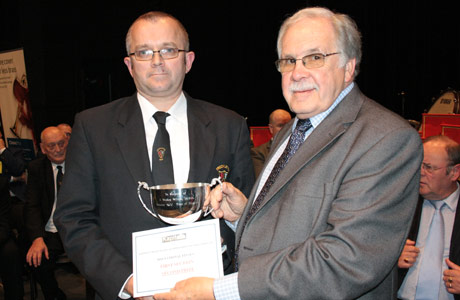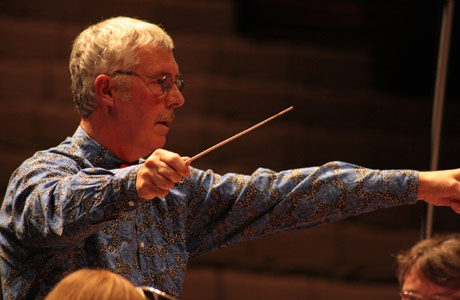2010 Lower Section National Finals - First Section retrospective
30-Sep-2010The sweet taste of success came to Friary Guildford at Harrogate on the weekend with a performance of stature to create a bit of banding history...

Well done Dad! Chris King enjoys the best congratulations possible
Picture: Steve Jack
As Friary Guildford and Chris King lifted the banner that proclaimed them as First Section National Champions, there might well have been the clinking of glasses back home in the Southern Counties as the realisation dawned that the band had made history by becoming the first from the region to lift the First Section trophy since its inception on 1992.
With many bands on the day finding George Lloyd’s ‘Diversions on a Bass Theme’ to be a test not only of musicality and technique but also stamina, it was more than just the ‘theme’ that was subjected to diversions.
A host of conductors either struggled to control the erratic variations of tempo recklessly set by their own players, or became the architect’s of their own downfall by heading off on the wrong trajectory to begin with - a mistake that yielded potentially disastrous results.
Magnifying glass
With little solo work to occupy the players, it was ensemble, balance and rhythmic precision that were to the fore, with Kevin Wadsworth (in the box with David Lancaster) commenting that the conductor’s had been placed ‘under the magnifying glass’.
What emerged was a contest of two halves with only our pre-contest favourites of Friary Guildford and Freckleton amongst the nine bands that played prior to the comfort break making any telling mark on the considerable challenges of the score.
Whether it was having the time to accumulate a little adrenalin that inspired the remaining bands, or the fact that there were clear opportunities to make an impact on the results table, it soon became obvious that the standard in the second half of the draw was considerably better, with several bands mounting a serious challenge for the title.
For Kevin it was simply ‘music’ that proved to be the winning factor in Friary Guildford’s dynamic and colourful performance, although one could easily add to that singular word of praise, ‘consistency’ as a vital ingredient.
The opening quavers in the basses were not the most precise of the day, but the quality of the band’s sound and a sense of palpable musical presence soon became clear, with wide ranging, yet carefully controlled dynamics, crystal clear ensemble and a style and poise to the lyrical passages that was testament to the preparation brought to the performance by Chris King and his players.

Just missing out: Freckleton claim second place
Picture: Steve Jack
London Pride
With Friary Guildford having dropped out of Championship Section banding in 2007, ‘London Pride’ (with just a little help from Bass) will be further bolstered when the band returns to the Stevenage to tackle ‘Paganini Variations’ in 2011.
Paul Dalton and Freckleton were always one of the hot pre-contest tips to take the trophy back to the North West, and although playing off an uncomfortable number two draw, made a strong early impression on the contest after Hebden Bridge had delivered an untidy and lack lustre account under Roy Curran to open proceedings.
David Lancaster alluded clearly to aspects of balance in his closing comments and after an impressive opening it was balance (crucially in the quiet music as well as the louder passages) that helped to mark Freckleton’s reading as one of quality.
The playing was not without fleeting moments of insecurity, but with consistent and crucially maintained rhythmic momentum, second place was just reward for playing that possessed the stamp of musical quality throughout.
Surprise package
Wrexham Brass’s long wait to take to the stage as the last of the 18 bands couldn’t have been easy for Wayne Ruston and his team. And there were times during the band’s performance where it seemed to show, as after a safe opening, cracks started to appear in the ensemble and clarity of detail suffered.
Wrexham’s eventual third place was the surprise package amongst the top six for many, with a performance of clear musical intent that perhaps didn’t quite live up to its promise in execution.
It was that underlying musicality however that clearly caught the ear of the men that mattered, and resulted in another fine result for Wales following Tylorstown’s victory in the Second Section earlier in the day.

Put your shirt on it - Rob Boulter leads Oddfellows Brass
Picture: Steve Jack
Taut
There were many in the audience that tipped Bo’ness & Carriden’s committed performance under Steve Sykes as a possible winner, and there was certainly plenty to admire in the taut rhythmic drive, sense of musical line and cohesive structure that band and MD brought to their interpretation.
There were also occasional lapses in tuning and precision however that saw the adjudicator’s take a slightly harder line than the second place finish or better many predicted.
Soprano player Richard Tobin did however pick up a deserved consolation prize as ‘Best Instrumentalist’ on a day when many players in the soprano chair will have cursed Lloyd’s decidedly tricky writing for the instrument.
In fifth place, there was a good deal of quality to be heard from the experienced heads around the stands of Derwent Brass, although Keith Leonard occasionally found himself in competition with the band as the tempo pushed on dangerously: The musical brakes needed to be rapidly applied on more than one occasion.
There was impressive ensemble work on display though, as was the case with sixth placed Bournemouth Concert under Dave Barringer, with their ensemble detail in the quiet passages being some of the most impressive playing of the day.
As with Derwent though, there was a real threat of things running out of control at times, a point which was clearly not lost on Messrs Wadsworth and Lancaster.

Bo'ness claim the Best Soloist Prize
Picture: Steve Jack
Intriguing
Richard Evans and Barton Town delivered one of the most intriguing performances of the day to secure seventh place; detailed, balanced and dynamically astute, yet obviously lacking the weight of sound that marked the front runners on the day.
It was nonetheless an impressive, musical reading and one which could easily have squeezed into the top six.
In eighth and ninth positions, Portishead Town and Wansbeck Ashington Colliery were more inconsistent in execution but not without extended periods that impressed.
Under the experienced direction of ex Sun Life flugel player Ian Dickinson, Portishead’s performance was clearly conceived, but rocked precariously at times, whilst Wansbeck struggled with building any real cohesion in the passagework, despite a spirited conclusion and carefully graded dynamics.
Erratic
Lochgelly and Paul Drury were perhaps a touch lucky to pull off tenth place with an erratic performance that resulted in a rapidly mounting error count, whilst Midlanders Oddfellows, directed by the always colourfully attired Rob Boulter - a man with a collection of Hawaiian shirts that must match those of Jack Lord and Johnny Vegas for sheer variety - displayed a carefully thought through reading that could have fared better if the occasional strident sounds could have been kept under control and the faster tempos had not raced away.
Midland champion Langley will have known as they left the stage that they were capable of far better playing than they demonstrated, with Cliff Parker and his team experiencing some uncomfortable moments that resulted in a performance far removed from the band’s impressive rendition of ‘A Moorside Suite’ earlier in the year.
Kevin Wadsworth’s generous comment that all of the bands just about managed to play the piece on the day, undoubtedly disguised the fact that the six bands propping up the wrong end of the results table found the going to be very tough indeed.

The right diversion taken
Picture: Steve Jack
Slowest
Regent Brass and Alan Duguid gave by far the slowest reading of the day (or perhaps ever of the piece) but if the intention was to minimise the error count, the policy failed to pay off as the playing became increasingly ragged and tired as the performance progressed.
The challenges of the score were such that Silk Brass, Egham and Pontardulais Town were unable to capture either its essence or vitality, whilst for Yorkshire, after creditable third and fourth places in the Second Section earlier in the day, it was a case of mourning in the First Section as Hebden Bridge and Meltham & Meltham Mills failed to make any telling impact on the music and left banding’s heartland at the very bottom of the First Section ladder.
Decent conductor
As the results were announced on Saturday evening then and despite Friary Guildford’s MD Chris King self deprecatingly acknowledging the advice of ‘a decent conductor’ in Frank Renton, it was ultimately him and his team alone that were responsible for history being made, with a performance of ‘Diversions on a Bass Theme’ that stood head and shoulders above those around it.
With the play on words of George Lloyd’s ‘Bass’ theme no doubt not lost on a band that was once very closely linked to the brewing industry itself, the ale consumed during the diversion to the pub that followed the contest will have tasted very sweet indeed.
Christopher Thomas















